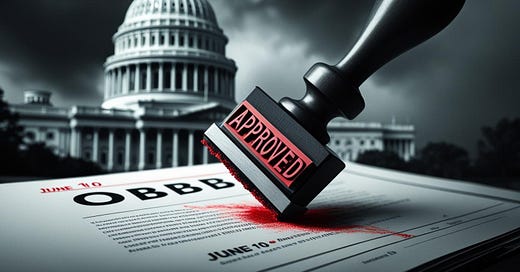What Did We Just Vote For Again? Inside the Quiet Reconfirmation of the OBBB
Despite inter-GOP conflict, the Revision passed the House again quietly, illustrating the theatre of politics
On June 10, House Republicans quietly voted to reaffirm one of the most controversial pieces of legislation in recent memory: the One Big Beautiful Bill (OBBB). Presented as a set of “technical corrections” to comply with Senate rules, this second vote was more than procedural. It was an opportunity to address the very provisions that drew outrage from members of their own party.
Instead, they doubled down.
We just hit 15,000 subscribers—thank you!
Get exclusive access for just $1/week or $52 a year.
Get exclusive analysis and fearless reporting you won’t find in corporate media.
The OBBB’s Second Life
The original OBBB narrowly passed the House on May 22 by a vote of 215–214. Marketed as a sweeping Trump-era fiscal vision, the bill set the stage for deep structural cuts and policy shifts across government. It contained everything from rollbacks on global aid and social programs to controversial measures like a 10-year ban on state AI regulation and limits on federal court injunctions against executive actions.
Facing resistance in the Senate, House leaders brought the bill back to the floor on June 10 to amend it for compliance with the Byrd Rule. This reconciliation rule limits the scope of what can be included in fast-track budget legislation.
The updates removed a few targeted provisions:
A retroactive clawback of the Employee Retention Credit (ERC)
An overreach on SNAP benefits
Defense spending earmarks and mining provisions
But the most controversial parts stayed unchanged and unchallenged.
See our reporting on the OBBB here:
The Critics Who Caved
This is where things get uncomfortable.
In the weeks between the two votes, several GOP lawmakers spoke out against the bill’s contents, most notably the AI moratorium and the judiciary restriction clause. Three admitted they didn't read the bill fully or didn’t realize something was included in it.
Marjorie Taylor Greene said she didn’t realize the AI moratorium was in the bill. “I would have voted no if I had known it was in there,” she told the press. However, when the June 10 vote came, with that exact provision still in place, she voted yes again.
Rep. Scott Perry echoed concerns, suggesting that parts of the bill didn’t reflect conservative priorities; however, he didn't change his vote.
Rep. Mike Flood took heat at a town hall for not knowing the bill limited the courts’ power. He admitted his mistake and condemned the clause. And yet, he voted yes again.
These were not last-minute surprises. The bill had been scrutinized, debated, reported on, and analyzed. Any member who wanted to act on their concerns had every opportunity to demand changes or switch their vote.
None did.
The bill passed narrowly once again.
No Concessions. No Accountability. Just Party Discipline.
The second vote was an opportunity to course-correct, not just on policy, but also on credibility. Lawmakers who had the political cover to distance themselves from the bill could have used this moment to show independence. Instead, they reaffirmed their commitment to the very provisions they claimed to oppose.
It’s a textbook case of political optics:
Talk tough to the press.
Vote the party line.
Hope no one notices the gap.
What Happens Now
The bill now moves to the Senate, where further amendments are likely, especially as the AI moratorium and judicial restrictions face scrutiny from both Democrats and libertarian Republicans. The final product will return to the House, requiring yet another vote.
The question is: Will anyone break ranks next time? Or will the strategy continue—complain publicly, conform privately?
The Message They Sent
The House had a second chance to get it right, to fix what even their own members admitted was wrong, and to show voters that criticism isn’t just performance.
Instead, they sent a different message: “You might care what’s in the bill. We don’t.”
They voted the same way, knowing everything they claimed they didn’t know before.
And for voters watching closely, that silence is louder than any floor speech.
Don’t Let This Be Another Forgotten Vote
If your representative voted for the OBBB on June 10, especially after criticizing it, they’re hoping you won’t notice. They’re counting on you being too overwhelmed, too distracted, or too discouraged to hold them accountable.
Prove them wrong.
Step 1: Call Your Representative
Tell them you did notice, and that you’ll remember.
Use the U.S. Capitol Switchboard to be connected to your member of Congress: (202) 224‑3121
State your ZIP code and ask to be connected to your Representative.
Sample Script:
“Hi, my name is [Your Name], and I’m a constituent from [Your City]. I’m calling to express my deep concern that Representative [Name] voted yes on the updated One Big Beautiful Bill on June 10. I’m especially disturbed that provisions like the AI moratorium and court restrictions remained in the bill, even after being criticized by members of their own party. I expect my representative to vote with principle, not just party. Please record my concern, and let them know I’ll be watching how they vote in the future.”
Step 2: Remember This at the Midterms
Every member of the House is up for re-election in 2026. Don’t let this vote disappear into the news cycle. Write it down. Talk about it. Bookmark this article.
When they come asking for your vote, ask them: “Why did you vote yes again, when you already knew what was in it?”
Show up at the polls and hold them accountable for not reading it the first time, and for caving to the pressure to vote for it once they did.
Step 3: Share and Speak Out
Copy the link to this piece. Post a screenshot of your call. Email this article to a friend who’s feeling politically hopeless and say: “This is why it feels broken, and this is where we can start holding people accountable.”
We just hit 15,000 subscribers—thank you!
Get exclusive access for just $1/week or $52 a year.
Get exclusive analysis and fearless reporting you won’t find in corporate media.
Bibliography:
Anderson, Jay. “The War Is on for Congress' AI Law Ban.” The Verge, June 11, 2025.
Bartkowski, Kayla. “Marjorie Taylor Greene Admits She Didn't Read Trump's 'Big, Beautiful Bill' Before Voting for It. Now She Has Regrets.” People, June 4, 2025.
“Flood Says He Didn't Read Portions of [the] Big Beautiful Bill Before Voting.” 3NewsNow, June 2025.
Gallagher, Roxanne. “Town Hall Erupts at GOP Rep’s Confession About Budget.” The Daily Beast, June 2025.
Kelsey, Sean. “Marjorie Taylor Greene Criticized for Not Reading Trump’s ‘Big Beautiful’ Bill.” The Guardian, June 3, 2025.
Smith, Janna Brancolini. “Town Hall Erupts at GOP Rep’s Confession About Budget Bill.” New Republic, June 2025.








It's so sad to see this. It's bad enough that some have agreed without having read everything. But to agree again after all the discussions and in full knowledge is disgusting